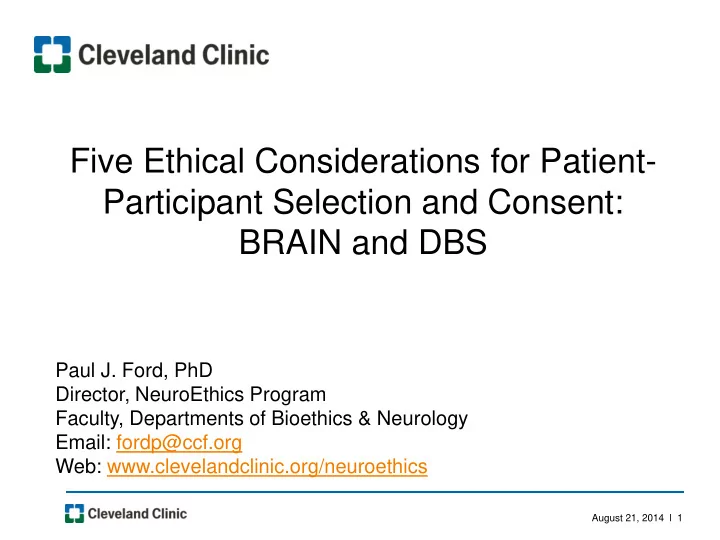

Five Ethical Considerations for Patient- Participant Selection and Consent: BRAIN and DBS Paul J. Ford, PhD Director, NeuroEthics Program Faculty, Departments of Bioethics & Neurology Email: fordp@ccf.org Web: www.clevelandclinic.org/neuroethics August 21, 2014 l 1
A CKNOWLEDGEMENTS ( ONLY A FEW OF MANY ) Jalayne Arias, JD, MA Scott Cooper, MD, PhD Joseph DeMarco, PhD John Gale, PhD Lara Jehi, MD Cynthia Kubu, PhD Andre Machado, MD, PhD Donald Malone, MD Imad Najm, MD, PhD Kimberly Yee, MA * Special thanks to all the Patients, Research Participants, and Families who have shared their stories. l August 21, 2014 l 2
1. Be Careful of Ockham’s Razor 2. Not All Brain Diseases Respond Similarly 3. Dispel Media/Societal Mythology 4. Vulnerability: Not So Fast with Assumptions 5. Patients as Collaborators August 21, 2014 l 3
B E C AREFUL OF O CKHAM ’ S R AZOR Brain models as more complex and not more reductive – More difficult task in consenting subjects (education) – Complex disorders/systems have unexpected side-effects (difficult to predict risk) Oversight of research – Proper expertise in neurosciences avoids over and under protection – Balance with efficient processes (see discussion of research impediments in Kelly et al Neurology 2014;82:1465–1473) August 21, 2014 l 4
N OT A LL B RAIN D ISEASES R ESPOND S IMILARLY Same technology have very different time courses – Deep Brain Stimulation [DBS] for Tremor (immediate), DBS for Dystonia (slow) Some interventions will only potentiate other therapy – DBS for Obsessive Compulsive Disorder: – Allows for normal brain plasticity and opportunity for conventional behavioral therapy to be effective Some illnesses are better addressed by less/non- physically/chemically direct modes (McGrath et. al. JAMA Psychiatry. 2013;70(8):821-829.) l August 21, 2014 l 5
D ISPEL M EDIA /S OCIETAL M YTHOLOGY News Stories, Research consent processes should Advertisements, and push back against these myths Movies • New obligation: account for popular narratives Magical thinking (How do we know which narratives? See about PCORI slide) neurotechnologies in the media (particularly neuro stimulators) Sets unrealistic expectations (See Racine et. al. Camb. Q. Healthc. Ethics. 2007;16(3):312–316; Gilbert and Ovadia. Frontiers in Integrative Neuroscience 2011;5 (16)) l August 21, 2014 l 6
V ULNERABILITY : N OT SO FAST WITH ASSUMPTIONS Must be clear on what type of vulnerability (Ford PJ. Law Med. Ethics. 2009; 37(1):73–83) Should not disadvantage vulnerable from advances (Fins JJ. Nature Rev. Neuro. 2003;4: 323-327) Mental health diagnosis does not necessarily make a person more vulnerable. (Bell et al. Camb. Q. Healthc. Ethics. 2014;23(3):361-8.) l August 21, 2014 l 7
V ULNERABILITY : N OT SO FAST WITH ASSUMPTIONS What kinds of risks/harms are too much? – Allowing a subject to return to a minimally unconscious state and lose “self” in an On/Off DBS protocol? (Schiff ND et al. Nature. 2007;448(7153):600-3) – Risk of death may be justifiable in some mental illnesses research. – Some Mental Illnesses have a mortality risk in themselves l August 21, 2014 l 8
P ATIENTS AS C OLLABORATORS Avoid assumptions about meaningful outcomes – Do patients want more control over their DBS? – Most wanted less control in our study (Kubu et. al., in preparation) Patient Centered Research Outcomes – Ask the stakeholders what makes life better? – Create outcomes that matter to patients Patient as Collaborator – Brain studies often rely on patient reported data – Need to be respectful of this effort l August 21, 2014 l 9
Be Careful of Ockham’s Razor Not All Brain Diseases Patients as Respond Similarly Collaborators Vulnerability: Dispel Not So Fast Media/Societal With Mythology Assumptions Epilepsy Ethics l August 21, 2014 l 10
Recommend
More recommend